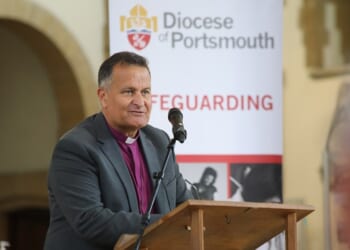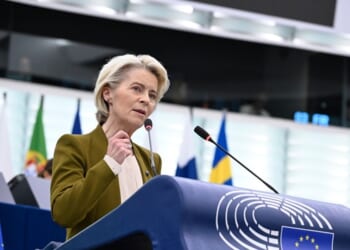AS THE Proms roll on and Edinburgh gets under way, there is another summer festival that, in its action-packed week is, chorally not least, a rival to both.
This summer, the energetic and superbly planned Three Choirs Festival moved on to Hereford, where Geraint Bowen, the cathedral’s Director of Music, was the mastermind behind each evening’s inspiring programme, as well as a host of daytime events embracing early music (notably the ensemble Stile Antico).
There were anniversaries to celebrate, such as those of Orlando Gibbons (died 1525), the long-lived Alice Parker (1925-2023), Palestrina (believed to have been born in 1525), and Sir Arthur Bliss (1891-1975) — whose Clarinet Quintet was enchantingly brought to life by Emma Johnson, and whose Three Animal Songs were heard alongside songs by Quilter and Schumann in the tenor James Gilchrist’s gripping recital. And Arvo Pärt turns 90.
The other galvanising song recital featured the baritone Roderick Williams, refreshingly backed up by Philip Brunelle with his renowned ensemble VocalEssence. Grieg’s cycle Four Psalms was one revelation. But everything that Williams sings (and composes) is a revelation.
There was excitement, too, at the appointment of Gavin Higgins as the festival’s inaugural associate composer. He has been acclaimed as “boldly imaginative” and “a talent to watch”. His gifts and Gloucestershire origins make him a perfect match.
Speaking of anniversaries, one of the most cleverly spotted was the bicentenary of Sir Frederick Ouseley (1825-89), who founded St Michael’s College, Tenbury, and here was represented by the introit “Jerusalem on high”, sung by all three cathedral choirs (Hereford, Gloucester, and Worcester) — a fitting and worthy commemoration.
They were supported by everyone’s surely most admired Three Choirs regulars, Peter Dyke, the exceptional and impressively loyal festival (and Hereford) organist. At the heart of every Three Choirs is daily evensong, mainly directed by one of the three cathedral music directors. Adrian Partington will take charge at next year’s festival in Gloucester, of which appetising details are already announced.
IT WAS the same cathedral forces’ masterly singers who turned to perform Handel’s oratorio Alexander’s Feast, which most of the audience clearly relished, but I thought utterly dire. It was finely sung of course, but the work is burdened with an appalling libretto, partially by Dryden, and the kind of music that Handel could write in his sleep.
But if I am brutally dismissing the Handel (he penned so many inspired and more appropriate sacred oratorios), and I also couldn’t really see the point of including Fauré’s Requiem. I must emphasise that the triple chorus was exemplary all week: not just in their balance and sheer musicality, but in their lucid enunciation — no easy task for some 150 (sometimes enhanced by the cathedral choirs) under all three conductors (and the Bach Choir’s David Hill).
The performance was happily uplifted by the three soloists: Rowan Pierce, Gwilym Bowen, and Gareth Brynmor John. Richard Bratby’s knowledgeable and insightful notes in the breathtakingly produced 200-page programme (editor: Catherine Lewen) illumined nearly every evening performance.
THE eight-day festival irrefutably triumphed in all the other hugely well-attended evening concerts. My candidate for the best was William Mathias’s cantata This Worlde’s Joie, originally pioneered here by Roy Massey, and given a glorious reading this time under Geraint Bowen. The work is a masterpiece by an outstanding and productive composer whom we lost at the age of only 57.
The work, evoking the four seasons, like Haydn’s oratorio, and extolling courtly, or shepherdly, love (and its demise) — “Ah, what is love? It is a pretty thing” (Robert Greene, 1558-92) — had me wondering whether Eleanor Dennis might prove the most fabulous soloist of the week; but then, the next night, in Richard Blackford’s marvellous new cantata The Black Lake, prize-festooned Elizabeth Watts gave such a humdinger of a performance that I must award both the laurels. That is even before one cheers and applauds James Oxley’s “The other day I heard a maid”, or Malachy Frame with chorus delivering the famous poem “Winter wakeneth all my care”, in This Worlde’s Joie. Truly, what a feast.
Mathias amasse an rich anthology of poems, some very early (around 1300), some reaching into the 16th century. To hear his settings of “Adam lay i-bounden” and “I sing of a maiden” — which rival those of Peter Warlock and Patrick Hadley, whose touching feel had so often seemed unmatchable — was pure joy, especially with the chorus on such intelligent top form. The work, words and music, so delicate, called out remarkably refined singing — from the superbly trained young choristers as well.
Other passages call to mind Britten: “Pleasure it is To hear iwis The birdés sing.” Then medieval gloom — or resignation: “Mankind all shall come to dust.” With “He came all so still”, Christ enters late chapters, never more so than in the threatening, then reassuring, lines of William Dunbar: “Done is a battle on the dragon black!’, also violently set by Bliss in his late cantata Shield of Faith, and certainly stirring here. Above all beamed the unmitigated charm, restraint, delicacy, and sensitivity that Geraint Bowen inculcated into all forces. Thanks to him, This Worlde’s Joie came across gloriously. A real high spot.
I WONDERED whether the Mathias might be the week’s supreme achievement. But then I was bowled over by much more. Letting the resident Philharmonia Orchestra, led by the marvellous Zsolt-Tihamér Visontay, loose on the sizzling Overture to The Wreckers by Dame Ethel Smyth produced the kind of dazzling show that we received from the orchestra all week (and always do). Even Dvorák’s American calling card, his Te Deum, was passionately thundered down the aisles.
It was Bob Chilcott who handsomely rewarded the unbelievably polished Three Choirs Festival Youth Choir, entrusted with the first performance of his Mass for Peace and Reconciliation.
Under Samuel Hudson, and featuring the eloquent Flowers Band, the question was, could the Youth Choir, inspired by this challenge and the music, match their elders? The answer was: they could and did. Chilcott must have been delighted with this performance. He has included imaginative passages of biblical text: once again, the dragons combating the angels, the misery of “wars and rumours of wars”, and their very opposite, the Beatitudes, plus hopefulness at the end (Philippians and John 14). He, too, calls for sensitivity from his chorus and mezzo soloist, Helen Charlston. Under Hudson’s nursing, he certainly got it.
Three Choirs commissions are nearly always notable; and to provide Richard Blackford with an opportunity for another of his terrific full-length oratorios (Mirror of Perfection, Voices of Exile, Pietà, and more) was surely inspired. Some people may have been slightly surprised that he hinged The Black Lake on two (brilliant) adult Narrators (Bersan Llwyd as the Mother as Steffan Rhodri amazing as the inquisitive little boy in this very Welsh tale).
In Blackford’s score, inventive as always, the mystery, wonderment, optimism, and doubt are all beautifully painted. The music, endlessly expressive and well-judged, speaks volumes, in Blackford’s very agreeable, entrancing style, given his perceptive insight into the story’s humanity. It was a rousing success. Watts was also knockout in Britten’s sensational Rimbaud cycle Les Illuminations (with her rather explosive acting).
IT IS difficult to fit all in to one review: the very traditional (Victorian-like) conclusion with Mendelssohn’s Elijah (splendidly stormy chorus yet again), or the incredibly moving Holocaust story Letters from Lony by the much missed Ronald Corp (Obituary, 16 May). Here, the Jewish grandmother (Lony or Leonie) writes to, and for, her infant grandson, until the inevitable happens and, transported, she succumbs at Auschwitz. It is an astonishing, long text to set, but Corp’s brilliance at writing for children and adults alike, in a relatively traditional idiom, makes everything shine.
I have left miserable space to include Adrian Partington’s beautifully presented performance of Herbert Howells’s Hymnus Paradisi: a work long shelved by the composer, but — though his chosen texts don’t quite show it — one that exorcises his grief for the loss of his nine-year-old son Michael (hence the hymn tune of the same name). Yet again, subtlety and forbearance are needed, and Partington prised both out of the chorus, making one all the more eager for next year’s festival.
YET, for me, the revelation of the week was the 90-minute full-length oratorio The Atonement (1903), by the London-born (black) composer Samuel Coleridge-Taylor (1875-1912, so his 150th anniversary). Critics liked or didn’t like it, and Elgar, who had introduced the composer to the Three Choirs five years earlier, scoring a run of successes, rather snorted at it. The librettist, Alice Parsons, came in for some flak for her frankly superb libretto. The music was not only beautifully conceived and apt for these extended passages of the Gospel story, but fabulously orchestrated.
This bracing, vivid, exciting, and expressive oratorio, whatever Elgar opined, needs no patronising. It is top-drawer — virtually up to Elgar’s own standard. Top marks to Geraint Bowen and his entire enterprising team for grasping the nettle, brushing aside any risk, and determining to include this massive and massively rewarding choral masterpiece. It paid off.
But that’s what the Three Choirs is for — its raison d’être. Let us hope that it won’t need another anniversary for someone to take up The Atonement once more.














